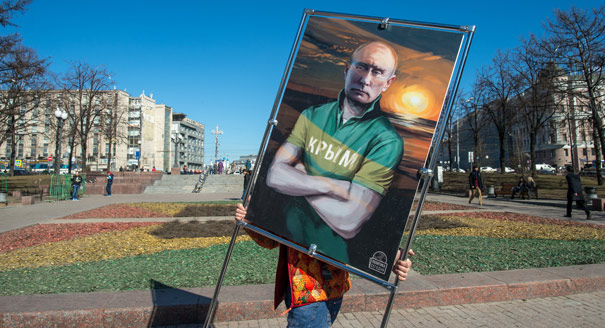Russian President Vladimir Putin’s visit to Crimea's most famous city, Sevastopol, in August drew headlines about his descent into the Black Sea to visit a sunken galleon and the local authorities’ appeal to allow wine to be used for medicinal purposes in health spas. But there was a real political component to the trip as well.
By making personal visit to Sevastopol, Putin was seeking to calm tensions in a city that is seething with political conflict. Shortly before the president made his trip, a threat of large-scale street protests was averted only after direct intervention from Moscow.
Sevastopol's conflict is between two political heavyweights, Governor Sergey Meniaylo and city assembly speaker Alexey Chaliy.
Chaliy, the popular mayor of Sevastopol, was a hero of the separatist movement against Kiev in 2014 who had declined the seat of governor of the region. As a politician with business assets and strong popular support, he probably did so out of a reluctance to subordinate himself to the presidential administration in Moscow.
Chaliy opted for the more convenient and secure position of speaker in the legislative assembly, where he gained the support of most deputies and promptly began denouncing the decisions of the local executive branch. In the summer of 2014, Chaily was already telling the citizens of Sevastopol, in a video message to forgive him for “allowing incompetent individuals” (meaning chiefly Sergey Meniaylo), to come to power.
The main object of attacks by Chaliy and media close to him has been construction work in the city and the alleged role in them of former Ukrainian defense minister Pavel Lebedev. Russian-born Lebedev was minister of defense at the time of the fall of Viktor Yanukovych. In that job he oversaw the distribution of land and real estate in Sevastopol that was given up by Russia’s Black Sea Fleet after 2010.
When the new government took power in Kyiv in 2014, Lebedev moved to Crimea and out of the public eye, citing “family circumstances.” Following Crimea’s de facto accession to Russia, the property of Ukrainian oligarchs—including Igor Kolomoisky and Petro Poroshenko—was nationalized by the new republic, but Lebedev was unaffected. His Parangon company is still heavily involved in construction in Crimea, including Sevastopol.
Lebedev himself openly advertises his “partnership” with Governor Meniaylo. In April he joined the governor at the opening ceremony for a new alley in Sevastopol’s Victory Park. Deputies and public figures loyal to Chaliy have criticized what they call “a merger between the local executive branch and clan-oligarchic Ukrainian capitalism.”
The governor and the speaker have clashed publicly over several issues. In May Meniyalo wanted to transfer a plot of land to the Night Wolves motorcycle club to set up a "patriotic center" for recreation. Chaliy demanded to see a copy of the plans for the center and blocked the move for a time. However, the transfer went through in July.
A few days later, Meniyalo named Sergey Khalyuta, the archpriest of the Sevastopol diocese of the Ukrainian Orthodox Church (Moscow Patriarchate), as director of Crimea's most famous archaeological museum at Chersonesus.
The museum staff were confounded by the appointment of a man lacking the relevant professional education to head their institution. Khalyuta was not just a priest, but the cleric in charge of Saint Vladimir Cathedral, located on the territory of the archaeological site. The appointment looked like an attempt by the church to get more of the museum's land and restore a monastery which had previously stood on the site.
Under public pressure, Meniaylo cancelled the appointment. Chaliy's allies capitalized on this success by applying for permission to hold a public rally on August 12 protesting against illegal construction and calling for greater transparency in municipal spending.
The conflict was finally defused only after talks between Chaliy and top Kremlin official Vyacheslav Volodin. Volodin reportedly advised Chaliy to stop pressuring Meniaylo and to “not become another Navalny,” a reference to prominent Russian opposition politician and anti-corruption activist Alexei Navalny.
Following this defeat, Chaliy’s supporters sent a petition, signed by 22,000 people, or seven percent of Sevastopol’s entire population, asking President Putin to hold members of the local administration responsible for blunders and a city development policy they deemed to be criminal.
However, predictably, Moscow sided against Chaliy and with Governor Sergey Meniaylo. Chaliy's chosen tactic of public pressure worked well against Kyiv in the winter of 2014, but is not deemed by Moscow an acceptable means of waging domestic political fights.
“Moscow might have tolerated the breaking of a taboo on members of the political elite fighting their conflicts in public, " said Crimea-based political scientist Eduard Zhuravlev. "But it was unacceptable to drag the people of Sevastopol into the fight, particularly as the election campaign for the State Duma is just kicking off."
The Sevastopol conflict may play out in different ways. The conflict may gradually die down with the governor and speaker, at least temporarily, joining forces in order to achieve certain goals in the upcoming parliamentary campaign. This will require a scapegoat, perhaps the governor’s deputy for regional policy Yevgeny Dubovik. This scenario is credible because the political saga has taken a toll on all the combatants.
But it is also possible that the clash will continue, in spite of the wishes of Moscow. This is possible simply because Alexei Chaliy and his team still enjoy a high level of support with the electorate and cannot easily be replaced. However, Chaliy may also draw on this support to run for the Russian parliamentary elections in 2016 and therefore quit the city of his own accord.
Andrey Sambros is a political analyst and independent journalist from Simferopol
